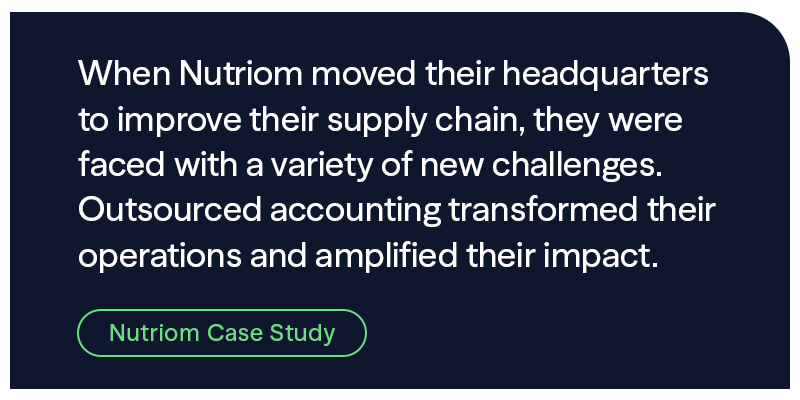Key Takeaways
- Strategic analysis of your accounting data can reveal hidden business opportunities and potential challenges.
- Clear financial monitoring and reporting processes are essential for maintaining operational efficiency and preventing systemic issues.
- Outsourcing accounting provides analytical expertise that transforms accounting from record-keeping into a strategic business optimization tool.
Accounting is more than just bookkeeping — it's a powerful analytical tool that can uncover hidden business opportunities and challenges. When properly leveraged, accounting data enables organizations to refine forecasting models, optimize cash flow, and make data-driven strategic decisions.
Transform Financial Data into Strategic Insights
Outdated or misaligned financial information can lead to faulty assumptions and missed opportunities, directly impacting your organization’s ability to execute strategic initiatives successfully. To transform accounting from a basic necessity into a strategic asset, your organization needs dedicated expertise to ensure accurate data collection, sophisticated analysis, and actionable insights.
Even if you have an in-house accounting team, you may find that outsourcing is a more cost-effective way to access high-level expertise and advanced analytical capabilities. Outsourced accounting partners can help evaluate your current financial health, improve reporting processes, and provide the detailed analysis needed to drive strategic decision-making — from cash flow forecasting to budget optimization.
Leverage Financial Data to Uncover Opportunities
Your accounting data tells a story about your business's health and potential — if you know how to interpret it. By analyzing key financial metrics and patterns, you can diagnose issues before they become critical problems and identify opportunities for growth.
Here are specific ways accounting data can illuminate business challenges:
- Irregular cash flow patterns might reveal inefficient collection processes or seasonal constraints requiring adjusted payment terms.
- Unexpected cost variations could signal supply chain inefficiencies or needed vendor negotiations.
- Margin analysis across product lines or services can highlight which offerings deserve more investment — or need strategic reassessment.
- Trend analysis in accounts receivable aging can expose credit policy issues or customer segments requiring attention.
Professional accounting professionals bring both analytical expertise and industry benchmarks to this process. They can help establish monitoring systems that flag potential issues early, implement corrective measures, and track the impact of changes across your operation. This data-driven approach transforms accounting from a record-keeping function into a strategic tool for business optimization.
Monitor Financial Metrics to Prevent Business Problems
Before diving into advanced analytics, it's essential to recognize the common indicators of financial distress that often appear in your accounting data long before they impact your operations.
Watch out for these financial red flags:
Cash Flow Problems
Common cash flow issues include smaller profit margins, loss of sales, theft, and allowing accounts receivables to get too backed up.
Mountains of Accounts Payable
When you “pay” your bills on credit, they go to the accounts payable ledger. Not paying them off can create a mountain of bills. To improve your accounts payable process, set up procedures for cross-checking payments, always check pricing options from competitors and vendors, and be sure that billing amounts are being entered correctly.
Inventory Issues
Inventory metrics are key to understanding your finances and improving processes. If you have too much inventory that doesn’t sell, you’re losing money on storage costs. If you sell perishable products, you lose money if they don’t move fast enough.
Profit Problems
Issues with profit and profit margins are important, though obvious, red flags. In its simplest form, profit is when you have more revenue than expenses. You’ll need to make sure your gross profit margin (% of revenue that exceeds cost of goods sold) is enough to cover all the other expenses of your organization. That’s your net profit.
Inconsistent Financial Data
When numbers don't match across different financial reports, it's a sign of trouble. Look for mismatched balances between statements and unexplained variances. To fix this, establish clear data entry procedures and regular verification steps.
Overreliance on Manual Adjustments
Frequent manual entries to fix or adjust accounts indicate underlying system problems. This increases error risk and wastes valuable time. Consider automating routine transactions and upgrading your accounting software to reduce manual work.
Inefficient Reconciliations
When account reconciliations take too long or require extensive research, you likely have problems with how transactions are being recorded. Set up regular reconciliation schedules and maintain clear documentation to catch issues early.
Proactive financial monitoring acts as an early warning system, enabling your organization to detect and resolve potential issues before they escalate. By systematically tracking key metrics, you can maintain financial control and operational efficiency.
Transform Accounting Data into Business Intelligence
Your financial data can also serve as more than just a historical record of transactions. When properly leveraged, it becomes a powerful tool for forward-looking business decisions.
Predictive Modeling and Forecasting
By analyzing historical accounting data patterns, your team can develop sophisticated predictive models that anticipate future financial trends.
For example, these models can:
- Forecast revenue streams based on seasonal patterns and market conditions
- Identify potential financial risks before they materialize
- Model the impact of various economic scenarios on business performance
Strategic Scenario Planning
Future strategy can be based upon robust scenario planning exercises using the data to:
- Evaluate the financial impact of different strategic initiatives
- Assess the implications of market changes or competitive actions
- Plan for various economic conditions and stress-test business models
- Optimize resource allocation across departments and projects
Competitive Benchmarking
Understanding where your organization stands in comparison to your competitors is essential. Your financial metrics can help you determine crucial benchmarks.
- Compare key performance indicators (KPIs) against industry standards
- Identify areas for operational improvement based on peer performance
- Evaluate market position and competitive advantages
- Set realistic targets based on industry best practices
Alignment of Financial Data with Strategic Goals
The true value of accounting insights emerges when they are explicitly aligned with strategic objectives.
- Develop custom metrics that directly measure progress toward strategic goals
- Create dashboards that highlight strategically relevant financial indicators
- Ensure budgeting and resource allocation support strategic priorities
- Track the financial impact of strategic initiatives
Measuring Return on Investment
Advanced accounting analytics enable more sophisticated ROI calculations for:
- Technology investments and digital transformation initiatives
- Marketing campaigns and customer acquisition programs
- Capital expenditures and infrastructure improvements
- Research and development projects
By treating accounting data as a strategic asset rather than just a compliance requirement, organizations can unlock valuable insights that drive better decision-making and competitive advantage.
The key lies in developing systematic approaches to collecting, analyzing, and acting upon financial information in ways that directly support business objectives.
Embrace a Hands-on Leadership Approach
As a business leader, you must be hands-on when it comes to finances. Being involved and invested in accounting best practices can save time and prevent potential risk at your organization.
In addition, taking an active role in financial management allows you to clearly communicate strategic goals, collaborate across departments to set meaningful KPIs, and foster a data-driven culture.
You’ll find regularly reviewing key metrics like cash flow and reconciling financial data protects against risks, enhances transparency, and strengthens decision-making, laying the foundation for your organization’s success.
Gain Expertise with Outsourced Accounting
Outsourcing your accounting functions offers more than just cost savings — it provides a strategic edge for your business. Experienced accounting professionals bring specialized expertise and industry knowledge, delivering actionable insights that go beyond basic number crunching. They can identify trends, highlight opportunities, and address challenges with a broader perspective that internal teams may lack.
By streamlining financial processes through technology and best practices, outsourced accountants help improve efficiency and reduce errors, allowing your business to focus on growth and innovation.
Make a habit of sustained success.

Client Accounting Services
Outsourcing core accounting functions can help streamline processes, eliminate inefficiencies, and improve operations.
Who We Are
Eide Bailly is a CPA firm bringing practical expertise in tax, audit, and advisory to help you perform, protect, and prosper with confidence.



